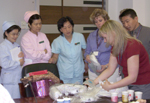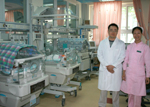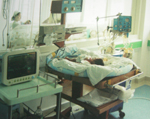Nurse delegation to China could spur
more visits
An
MUSC-led American neonatal nurse delegation to China discovered
differences between the two countries’ cultures and their abilities to
deliver critical and quality care to the most vulnerable of human
life—premature infants. Chinese nurses
observe a demonstration in developmental care with nurses Emma Puskas,
R.N., second from right, and former MUSC nurse Suzanne Staebler, NNP,
third from right, as their guide and interpreter Qi Yi looks on.
Chinese nurses
observe a demonstration in developmental care with nurses Emma Puskas,
R.N., second from right, and former MUSC nurse Suzanne Staebler, NNP,
third from right, as their guide and interpreter Qi Yi looks on.A team of 27 neonatal nurses from 14 states embarked on the inaugural journey May 6-18. As the first trip of its kind, the expedition has positioned MUSC to lead future knowledge and training exchange visits that will improve the methods that Chinese medical and nursing practitioners can use to care for and treat premature babies.
Robin Bissinger, Ph.D., a neonatal nurse practitioner (NNP), coordinated the delegation trip that included six facilities in three cities. MUSC’s delegation represented the largest of any state, and included Cyndi Weiss, registered nurse certified in neonatal intensive care and clinical nurse leader in the Neonatal Intensive Care Unit (NICU); Cheryl Carlson, NNP; Annette Kibler, NNP; and new MUSC nursing graduate, Bresney Crowell, R.N. The entire delegation was set up by the People to People Ambassador Program and sponsored by the National Association of Neonatal Nurses. The purpose of the trip was to share knowledge across cultures and provide education on common afflictions of premature babies including asphyxia, neonatal resuscitation, infection, and developmental care.
The delegation met with neonatal nurses and physicians at five hospitals and one home care center in Beijing, Guilin and Shanghai. Though some of the Chinese nurses spoke a little English, the delegation was assigned a guide who interpreted all of the meetings and consultations.
 Doctors and nurses
earn similar pay and share similar duties in Chinese NICUs.
Doctors and nurses
earn similar pay and share similar duties in Chinese NICUs.While touring the facilities, the delegation realized that the Chinese nurses were at least 15 years behind those in the United States, and that developmental care was a new concept that only one facility was attempting to provide, albeit at a basic level. Premature infants generally are placed in an open incubator without having their bodies developmentally supported to improve outcomes. Many infants are co-bedded, including those who are not related.
Infection is an enormous problem in many Chinese nurseries despite their perceived sterility. In Guilin, delegates asked about infection control practices and Chinese colleagues explained that the top three ways to prevent infection were: to open windows twice a day to air out the unit; wash the floors twice a day to keep down the dirt; and limit visitors. Consequently, sterility and hygiene standards are much lower in China than in the United States as evidenced in the facilities the delegation visited.
Chinese nurses and physicians, who earn similar pay and share many of the same clinical duties, appeared very interested in learning about how to improve treatment and care for premature babies. Overcoming the basics, such as hygiene, is a challenge to ensure improved treatment of these infants.
 No railings or
blankets support this baby in a makeshift bed in a Chinese NICU.
No railings or
blankets support this baby in a makeshift bed in a Chinese NICU.Some of the facilities had no running hot water, and hot water was transported in thermoses and other bottles. Open, dirty buckets on tops of counters held water that often was used on numerous infants and patients. Hand-washing is not a universal practice among the Chinese, though they expressed interest in education pertaining to hand-washing and other infection-control practices, such as alcohol-based sanitizers.
Nurses and physicians wear scrubs and open sandals with socks, and shoes are worn when they enter the unit. Because there is no air conditioning, the windows were opened despite the dangerously high levels of pervasive air toxins in the Chinese environment. To protect babies from flying insects, the beds were covered with mosquito nets.
Interestingly, while the beds and babies were covered, none of the equipment or supplies was. During a tour of the NICU in Beijing, delegates were perplexed to discover very expensive equipment, which included Giraffe warmers, yet the babies shared glass bottles that were rinsed and sitting on the sink.
Cultural differences pose significant problems for a number of developmental care practices that are preferred in caring for premature babies. There is no skin-to-skin contact between the mother and her premature baby. For example, when a baby is born premature, no one, including the mother, holds the infant. Instead, the mother, who is considered fragile, is sent home to rest for a month and does not see the baby until it is discharged. To feed these infants, nurses prop them up instead of holding them. Babies born without problems are immediately breastfed and enjoy the closeness of the mother, although more mothers in China are choosing to provide formula.
 Most all Chinese
infants swim within 48 hours of birth.
Most all Chinese
infants swim within 48 hours of birth.A practice the delegation found curious was “water therapy.” Most babies, even many premature babies and those with mild asphyxia, are put into a small swimming pool within 48 hours of delivery, because the Chinese believe that swimming promotes good health and strong growth. Mothers are taught before discharge how to continue this therapy at home.
Most of the units did not allow parental visitation. If babies are considered stable, they are wheeled out into the hallway for a visit once a day, but most often parents do not see their babies until discharge. This practice is based on infection control beliefs as well as the perceived fragility of the mothers.
The delegation visited a home care center to learn more about the needs of the mother after delivery and found that, though the majority of infants in China are breast-fed, infants in intensive care are given formula. Since mothers and babies are not together breastfeeding is not supported, and breast milk is not collected or administered. Instead, NICUs kept powdered formula at the sink to prepare the bottles for all the infants.
Of all the facilities visited, Shanghai seemed the most advanced and was considered one of the top neonatal units in the country. While also considered by Chinese standards to be sterile, the delegation was prohibited from seeing the neonatal unit.
The Chinese asked many questions about neonatal resuscitation, and were preparing for a huge forum the next day on hypothermia for asphyxiated infants. The MUSC team was able to share evidence-based information from work in the Total Body Cooling trial led by MUSC’s Doe Jenkins, M.D.
In its communist system, China’s health care is controlled by the government and very little outreach and clinics exist to meet the day to day health needs of the people. People seeking medical care go to the hospitals and stand in long lines that build at midnight with families and sick children lining up for first-come-first-served admission. Families bring food for the day with them. They wait quietly and patiently as the hours drag on.
Support widespread, repeating
The majority of team members received support and sponsorship from their hospitals and numerous corporations and businesses. The American Academy of Pediatrics’ perinatal section also supported the initiative and donated neonatal books as gifts to the Chinese colleagues. Children’s Medical Ventures Inc. sent the MUSC leaders large development care gift packs for each of the six facilities. These gift packs included products needed to begin developmental care in the hospitals, including: bindy bumpers that are used to provide boundaries for the infant, illuminated intravenous supplies, snugglies to keep an infant tucked in a developmental friendly position, pacifiers and books. The National Association of Neonatal Nurses also promoted the trip to NANN members, and the organization provided honorary memberships for two of the Chinese nurse managers.
Memberships, journals and even basic equipment often are cost-prohibitive for many of the Chinese facilities.
Two weeks after returning from China, the delegation leaders received a request for another visit. Some of their nurses also expressed a desire to come to the United States to learn more, but the financial cost is too great, they said.
If the delegation is to make another trip, Chinese colleagues were told that the focus would be on working side-by-side, as well as teaching. Emphasis would be made on developmental care methods at the bedside and looking at ways to improve development care and infection control without adding additional cost to the health care system.
Editor's note: The information in this article was provided by Robin Bissinger, Neonatal Nurse Practitioner.
Nurse works with Heart to Heart in China
After the People to People delegation left China, Cyndi Weiss, registered nurse certified in neonatal intensive care, stayed behind for a month and worked with Heart to Heart International. Heart to Heart International is a group Weiss has been involved with for the last three years, working to establish Neonatal Recitation Program (NRP) training sites in Sichuan Province, China.Six years ago, Heart to Heart International, a leading humanitarian organization based in Olathe, Kan., partnered with the American Academy of Pediatrics and the Sichuan Provincial Ministry of Health to bring NRP to Sichuan Province, China. Since 2000, volunteer NRP trainers have traveled annually to China’s Sichuan Province (population 90 million) to provide a “Train the Trainer” program to more than 6,000 medical personnel in 387 hospitals.
Birth asphyxia in China is a leading cause of morbidity and mortality, affecting approximately 4 percent (between 38,000 - 40,000 infants) of the 850,000 births in Sichuan province each year. Through the efforts of the program, the Sichuan Ministry of Health reports that birth asphyxia rate has been reduced to 2.9 percent, and nearly 90 percent of all newborns resuscitated are leading healthy lives.
“It has been a tremendous privilege for me to have been involved with this project for the past three years,” Weiss said. “The people we have met, the places we have seen, and the lives we have touched by teaching our Chinese colleagues basic resuscitation skills have been amazing. Neonatal care in China is still a challenge because of the many social, cultural and financial constraints. This program has opened opportunities and possibilities to further advance neonatal care to insure China’s children a healthier future, and that is very exciting.”
The Heart to Heart NRP project this year completed its goal of establishing six more NRP training sites for a total of 22 throughout Sichuan during the past seven years.
Friday, June 22, 2007
Catalyst Online is published weekly,
updated
as needed and improved from time to time by the MUSC Office of Public
Relations
for the faculty, employees and students of the Medical University of
South
Carolina. Catalyst Online editor, Kim Draughn, can be reached at
792-4107
or by email, catalyst@musc.edu. Editorial copy can be submitted to
Catalyst
Online and to The Catalyst in print by fax, 792-6723, or by email to
catalyst@musc.edu. To place an ad in The Catalyst hardcopy, call Island
Publications at 849-1778, ext. 201.